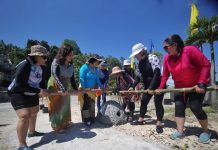In an unassuming compound found in the inland barangay of Ilagan, Barangay Limbaan, New Corella in Davao del Norte, one can find a pair of 
weavers, sometimes three if materials abound, working on the loom.
Here, world class tikog mats or banigs are woven.
Tikog or Fimbristylis Globulosa is a variety of reed that grows in swampy areas. From its stems, weavers make mats, bags, hats, slippers and other handicraft products.
Silagan Handicraft, a business started by husband and wife Joaquin and Clara Silagan, is world renowned for its banigs and other tikog products.
The business started in 1989 as a livelihood project for the women in the village. The project was not sustained but it paved the way for the Silagans to start their own business.A
Joaquin, a mechanical engineer who worked at the National Irrigation Authority, retired early from his job to concentrate on the business. Using his engineering skills, he was able to design and produce a loom that enabled weavers to make top quality banigs.
Because of the quality of the banigs and other tikog-made products Silagan Handicrafts produce, they slowly gained recognition. Their products became a regular feature during trade fairs organized by the Department of Trade and Industry across the country.
Their coloful and skillfully woven products have also been displayed–and appreciated– in world trade fairs in Milan and Hawaii. These days, the Silagans continue to get invitations for other world trade fairs in other parts of the world.
“We have invitations to join the trade fairs in Hong Kong, Dubai and Europe this year but we might not be able to join because our production is low,” Joaquin said.
While other businesses struggle their way through the market, the Silagans face a different challenge — meeting the demands of the market. This is a problem that can easily be addressed if there are ready materials available.
Joaquin explained that while there are weavers, the tikogs–the raw material–are getting scarce.
Silagan Handicrafts is the sole supplier of banigs to all SM Malls nationwide. They also supply banigs to a Balikbayan center in Makati and Bohol and other department stores in Mindanao.
Since the demand for their banigs and other products are very high and their production is low, they are forced to turn down some orders. They have also suspended their exportation plans because of this.
To produce 500 mats, weavers need 700 kilos of tikogs. However, getting this much raw material has become very difficult because the tikog farms in New Corella have long been converted to banana plantations. The remaining areas with tikogs are not just enough for the demand.
For them to get the needed raw materials, the Silangans sometimes have to travel to Agusan del Sur.
At one point, the Silagans employed 20 workers in their business. However, as the materials caused the production to slow down, the number of workers dwindled. The scarcity of raw materials has led the Silangans to start their own tikog farm in a parcel of land they own.
The handicraft business of the Silagans helped them send their children to school. It has also helped the people in their community whom they employed.
“We have seen the lives of our employees improve. They were able to send their children to school and buy the things they needed,” Joaquin said.
The story of the Silagans is a testament that ingenuity coupled with the drive for excellence is a sure formula for success.
0 Comments
Oldest





